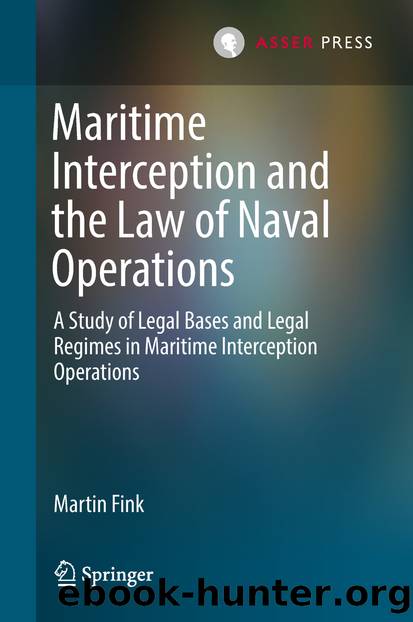Maritime Interception and the Law of Naval Operations by Martin Fink

Author:Martin Fink
Language: eng
Format: epub
ISBN: 9789462652491
Publisher: T.M.C. Asser Press
8.4 UNCLOS
UNCLOS contains provisions based on which it is allowed to interfere with foreign-flagged vessels on the high seas . These provisions are laid down in Articles 98, 110 and 111 UNCLOS.24 Arguably, these provisions codify existing international customary law. These provisions contain six subjects altogether: rendering assistance, piracy , slave trade, unauthorized broadcasting, statelessness and hot pursuit.
Articles 100–107 and 110 UNCLOS relate to the law of piracy . A lot has been written on the law of piracy laid down in UNCLOS since the multinational efforts of navies started to patrol the seas around the Horn of Africa supported by UN resolutions. In this context however Articles 105 and 110 are UNCLOS are of particular importance. Article 105 UNCLOS allows States to establish universal jurisdiction over piracy on the high seas , or any other place outside the jurisdiction of any State.25 When properly authorized through national legislation, warships of all States can board a vessel suspected of piracy, arrest the persons and seize the property on board. Article 110 UNCLOS provides the authority to board a foreign-flagged vessel, under the condition that there is a reasonable ground for suspecting that the vessel engaged in piracy.
Obviously, the piracy provisions in UNCLOS have been well used in recent years, but also, as mentioned in Chap. 7, the notion of statelessness is used as a reason to board a vessel within the context of enhancing maritime security .
Apart from the more traditional provisions of 110 and 111 UNCLOS, one could argue that in the interest of saving human lives in danger of the perils of the sea, Article 98 UNCLOS concerning the rendering of assistance implies also that under circumstances of distress the boarding of a foreign-flagged vessel is permissible. The situation of distress allows (or rather: obliges) for immediate action taken by any mariner—man of war or merchantman—that can do so without serious danger to one’s own ship, crew or passengers. No consent of a flag State is needed to board a vessel in distress. Rendering assistance in a maritime context has a specific and long developed context, is codified not only in UNCLOS but also in other maritime law treaties,26 and focuses on the safety of the vessel and persons of the dangers that exists from the perils from the sea, for instance the lack of seaworthiness of a vessel drifting at sea. But it is, however, not meant to permit boarding when life-threatening danger arises between, for instance, persons on board. Rendering assistance has, in other words, a limited meaning and cannot be used in all circumstances of danger at sea.
Download
This site does not store any files on its server. We only index and link to content provided by other sites. Please contact the content providers to delete copyright contents if any and email us, we'll remove relevant links or contents immediately.
The Pirates of Somalia by Jay Bahadur(1621)
Political Theology by Carl Schmitt(1577)
The Holocaust: A New History by Laurence Rees(1519)
The Social Animal by David Brooks(1449)
A Practical Guide to International Arbitration in London by Hilary Heilbron(1425)
Restitution by Restitution(1424)
Pirates of Somalia by Jay Bahadur(1376)
Coercing Virtue by Robert H. Bork(1356)
The Nuremberg Interviews by Leon Goldensohn(1302)
Basic International Corporate Taxation by Sebastiano Garufi(1205)
A History Of Thailand by Baker Chris(1177)
International Trade and Business: Law, Policy and Ethics by Gabriël Moens & Peter Gillies(1137)
The Global Commons by Susan J. Buck(1137)
The Sovereignty of Human Rights by Macklem Patrick(1113)
Blood Profits by Vanessa Neumann(1113)
Asian Waters by Humphrey Hawksley(1113)
Spring Fever: The Illusion of Islamic Democracy by McCarthy Andrew C(1096)
The Nuremberg Trials: The Nazis and their Crimes Against Humanity by Roland Paul(1043)
Crimes Against Humanity: Historical Evolution and Contemporary Application by M. Cherif Bassiouni(1019)
